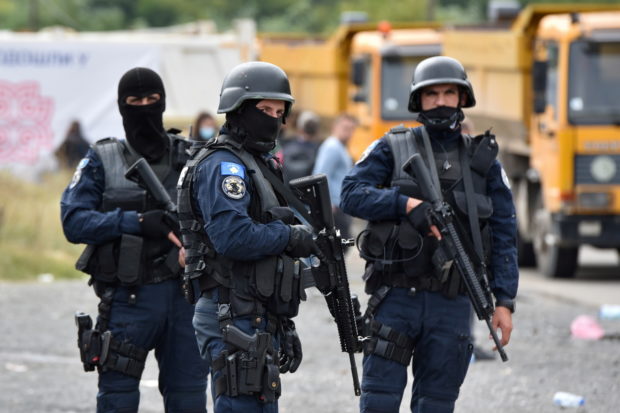
Kosovo special police officers are pictured as hundreds of Kosovo Serbs protest against a government ban on entry of vehicles with Serbian registration plates in Jarinje, Kosovo, September 21, 2021. REUTERS FILE PHOTO
PRISTINA — Two interior ministry offices in northern Kosovo were attacked near border crossings blocked by local Serbs angered by a ban on cars with Serbian license plates entering the country, police said on Saturday.
The car registration office in the town of Zubin Potok was set ablaze and two hand grenades were thrown at the civil registration office in the town of Zvecan, though they did not go off, the police said.
There was no mention of any casualties.
Serbs from Kosovo’s north have blocked two main roads near the border since the government ban went into force on Monday. All drivers from Serbia must now use temporary printed registration details that are valid for 60 days.
The Kosovo government says its move mirrors measures in force in Serbia against drivers from Kosovo since 2008, when Kosovo declared independence from Serbia.
Serb fighter planes flew close to border crossing Jarinje where Serb protesters cheered them. A day before, three helicopters also flew in the vicinity. Media in Belgrade reported that tanks and other military equipment were heading towards the border, but the Serb army did not give any details.
Tensions between the two countries are now at their highest for years. NATO’s mission in Kosovo, where peacekeepers maintain a fragile peace, called for restraint.
“Serbia clearly wants to militarize and escalate the situation. It is bringing close to the border Russian-made helicopters and airplanes … Serbia is provoking a serious international conflict”, Kosovo’s Prime Minister Albin Kurti told a news conference.
He accused Serbia of “encouraging and supporting” individuals to attack the state of Kosovo. Kosovo held an urgent security council meeting, but no details were given about what was discussed.
Kurti has asked Serbia to start recogizing Kosovo car license plates to allow free movement of people and goods. Serbian President Aleksandar Vucic has said Kosovo should first remove police units sent to the north of Kosovo to help enforce the car plate measures.The two countries committed in 2013 to a dialogue sponsored by the European Union to try to resolve outstanding issues but little progress has been made. Kosovo’s independence is recognized by some 110 countries including the United States, Britain and most Western states, but not by Russia, Serbia’s traditional ally, and five EU member states.